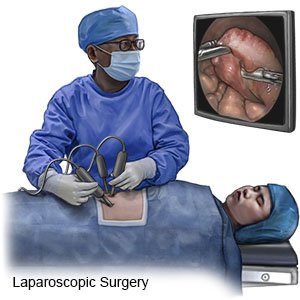Laparoscopic Herniorrhaphy
Medically reviewed by Drugs.com. Last updated on Dec 2, 2024.
WHAT YOU NEED TO KNOW:
Laparoscopic herniorrhaphy is surgery to repair a hernia. Laparoscopic surgery is done through small incisions.
HOW TO PREPARE:
The week before your surgery:
- Arrange to have someone drive you home after surgery.
- Tell your surgeon about all medicines you currently take. He or she will tell you if you need to stop any medicine for surgery, and when to stop. He or she will tell you which medicines to take or not take on the day of surgery.
- You may need an ultrasound or a CT scan to help plan your surgery.
The night before your surgery:
You may be told not to eat or drink anything after midnight.
The day of your surgery:
- You or a close family member will be asked to sign a legal document called a consent form. It gives healthcare providers permission to do the procedure or surgery. It also explains the problems that may happen, and your choices. Make sure all your questions are answered before you sign this form.
- Take only the medicines your surgeon told you to take.
- An IV will be put into a vein. You may get liquid or medicines through the IV.
- An anesthesiologist will talk to you before your surgery. Tell him or her if you or anyone in your family had a problem with anesthesia. You may be given general anesthesia to keep you asleep and free from pain during surgery. You may be given local anesthesia to numb the surgery area.
WHAT WILL HAPPEN:
What will happen:
- Your surgeon will make 3 to 4 small incisions around your groin area and into your abdomen. Tools will be inserted through the incisions. Carbon dioxide gas may be used to inflate your abdomen. The gas will help your surgeon see the area that needs repair.

- Your surgeon will examine the weakened muscles in your groin through the scope. He or she will remove your hernia or push it back into its normal space. A mesh patch may be placed over the area of the hernia and stapled or tacked in place. Your peritoneum (inner tissue lining of your abdomen) will then be closed over the mesh with staples or stitches.
- Your incisions will be closed with stitches and covered with a bandage. The bandage will help keep your incisions clean and dry, and help to prevent infection.
After your surgery:
You will be taken to a room to rest until you are fully awake. Healthcare providers will monitor you closely for any problems. Do not get out of bed until your healthcare provider says it is okay. When your healthcare provider sees that you are okay, you will be able to go home or be taken to your hospital room. An ultrasound may be done after your surgery to check the repair.
CONTACT YOUR HEALTHCARE PROVIDER IF:
- You have a fever.
- You get a cold or the flu.
- Your groin is swollen, painful, or feels warm to the touch.
- You have questions or concerns about your surgery.
Seek Care Immediately if
- You have nausea or are vomiting.
- Your hernia area suddenly becomes very painful.
- Your lump increases in size, or you are not able to push it back into your abdomen.
Risks
- You may bleed more than expected during your surgery or develop an infection. Your nerves, blood vessels, or abdominal organs may be injured during surgery. The contents of your bowel may spill into your abdomen and cause a severe infection. Your surgery may need to be changed into an open hernia repair surgery. An open surgery means your surgeon will make larger and deeper incisions, which will take longer to heal.
- You may have shoulder and chest pain from the gas used during your surgery. You may develop bruising, a seroma (collection of fluid), or an infection at your surgery site. You may have trouble emptying your bladder. You may develop a life-threatening blood clot. You may have chronic pain or numbness in your groin area for months or years after your surgery. You may need to have another surgery if your condition returns or occurs in a different area.
Care Agreement
You have the right to help plan your care. Learn about your health condition and how it may be treated. Discuss treatment options with your healthcare providers to decide what care you want to receive. You always have the right to refuse treatment.© Copyright Merative 2024 Information is for End User's use only and may not be sold, redistributed or otherwise used for commercial purposes.
The above information is an educational aid only. It is not intended as medical advice for individual conditions or treatments. Talk to your doctor, nurse or pharmacist before following any medical regimen to see if it is safe and effective for you.
Learn more about Laparoscopic Herniorrhaphy
Care guides
Further information
Always consult your healthcare provider to ensure the information displayed on this page applies to your personal circumstances.
